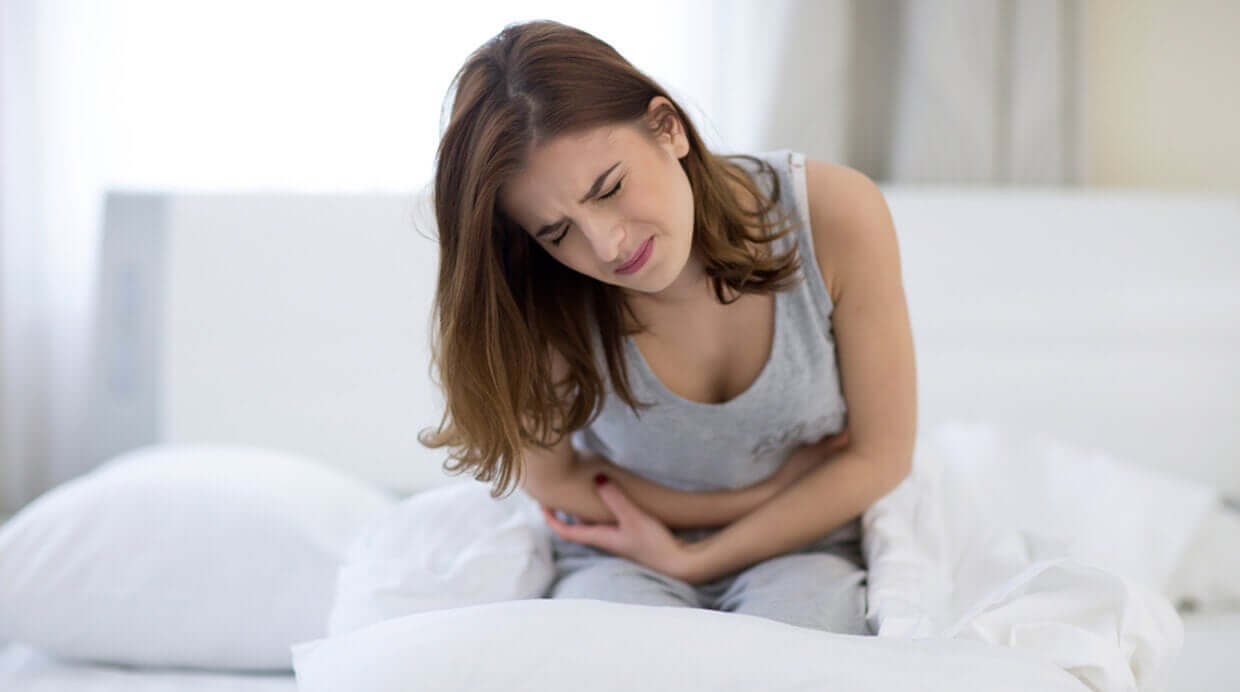Why Do Women Experience More Gas During Menstruation?

In principle, it may not seem possible that women tend to experience more gas during menstruation. However, the truth is that there’s a connection between one process and the other – even though the digestive system and the reproductive system are independent of each other.
For many women, excess gas during menstruation is a common symptom. In fact, this occurs in at least two-thirds of the female population. Also, those who already have a history of digestive problems suffer more severely from this situation.
So far, no exact and detailed explanation has been found as to why this phenomenon occurs. However, we know that the hormonal ups and downs brought about by the menstrual cycle end up affecting the gastrointestinal processes.
Let’s look at this in more detail.
The origin of gas

It’s normal to have gas and to pass it, even though there’s a certain social taboo and it causes embarrassment in some people. In fact, it’s completely natural for a person to pass gas between 6 and 20 times a day. What’s more, it’s also normal to burp three or four times after eating.
Gas is produced in the intestine or stomach as food is broken down in the body. Some foods produce more gas than others. Likewise, in some people, gas is more frequent than in others, without this implying any type of condition.
In addition to some foods, food intolerances, or the intake of certain medications, menstruation also gives rise to a greater amount of gas. This is due to changes in hormone levels in the body. That’s why it’s also a frequent situation during menopause.
You may be interested in: What Should You Avoid During Your Period?
Menstruation and digestion
During menstruation, large hormonal changes occur in the body. This often affects the digestive system. That’s why it’s normal during the menstrual cycle for these types of problems occur:
- Constipation. Generally, it occurs during ovulation, as the progesterone cycles decrease. The result is the relaxation of the muscles of the digestive tract. This, in turn, makes it more difficult to eliminate waste.
- Diarrhea. It’s common for women to experience diarrhea in the days previous to the beginning of their period. This is because, at that time, there’s an excess of serotonin and oxytocin, which leads to greater mobility in the intestines.
- Gases. Hormonal changes significantly alter the rhythms of digestion. This leads to a greater accumulation of gas during menstruation.
Gas during menstruation

Experts aren’t exactly sure of the reason behind increased gas during menstruation. However, according to available data, up to one-third of women who normally don’t have digestive difficulties have problems with gas during their period.
It’s a fact that progesterone reaches a peak days before a woman’s period begins. As we pointed out, this is what in principle affects the normal functioning of digestion. Sometimes there’s diarrhea, constipation, both, or generalized discomfort called “intestinal stress”.
In this regard, one of the studies carried out indicates that there’s a relationship between digestive problems and substances called prostaglandins. These act as hormones and are largely responsible for so-called menstrual cramps.
It seems that those who suffer from gastrointestinal problems during menstruation, also have a higher concentration of prostaglandins in the body. This leads to intestinal difficulties that also generate a greater amount of gas during menstruation.
Discover: What Should You Avoid During Your Period?
More information regarding gas during menstruation
Bacteria in the intestines also change with each menstrual cycle. This is because the hormonal fluctuation affects these bacteria and changes the composition of the bacteria in the intestine. This also changes bacterial fermentation. The consequence is that gas during menstruation has a more intense and foul-smelling odor.
Some foods are especially irritating during a woman’s period, particularly dairy products. It’s important to remember that these don’t only include milk, but all its derivatives. For example, cheese, butter, yogurt, and all processed foods that include milk in their composition.
Coffee usually causes similar effects. Both coffee and dairy products have an even more powerful effect on those women who’ve previously had a gastrointestinal problem. In fact, those who suffer from irritable bowel syndrome have a greater amount of gas and more severe symptoms during menstruation.
All cited sources were thoroughly reviewed by our team to ensure their quality, reliability, currency, and validity. The bibliography of this article was considered reliable and of academic or scientific accuracy.
- Ashley, C. D., Bishop, P., Smith, J. F., Reneal, P., & Perkins, C. (2000). Efectos de la Fase Menstrual sobre la Oxidación de Grasas y Carbohidratos durante el Ejercicio Prolongado en Mujeres Activas-G-SE/Editorial Board/Dpto. Contenido. PubliCE.
- Bernstein MT, Graff LA, Avery L, Palatnick C, Parnerowski K, Targownik LE. Gastrointestinal symptoms before and during menses in healthy women. BMC Womens Health. 2014;14:14. Published 2014 Jan 22. doi:10.1186/1472-6874-14-14
- Ricciotti E, FitzGerald GA. Prostaglandins and inflammation. Arterioscler Thromb Vasc Biol. 2011;31(5):986–1000. doi:10.1161/ATVBAHA.110.207449
- Jung HK, Kim DY, Moon IH. Effects of gender and menstrual cycle on colonic transit time in healthy subjects. Korean J Intern Med. 2003;18(3):181–186. doi:10.3904/kjim.2003.18.3.181
This text is provided for informational purposes only and does not replace consultation with a professional. If in doubt, consult your specialist.








